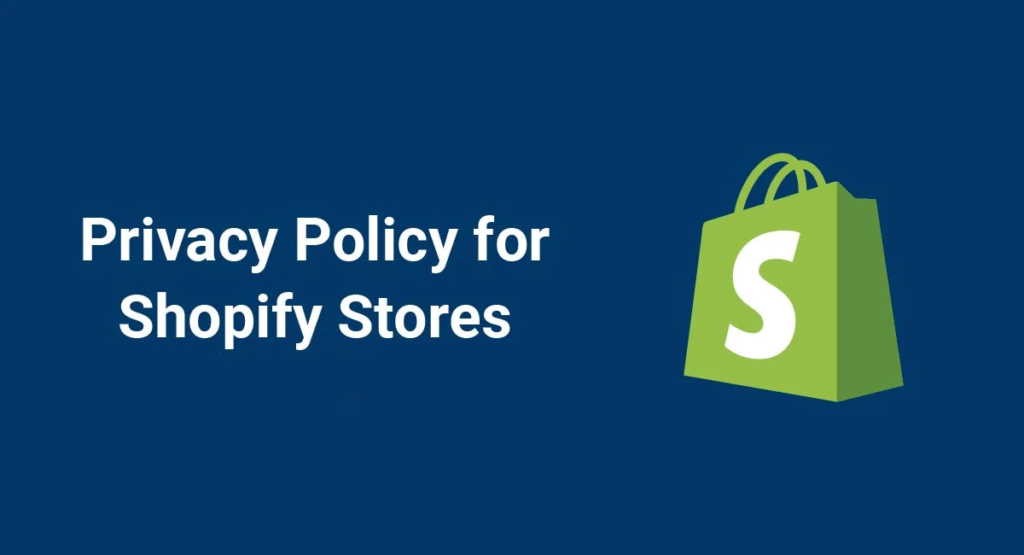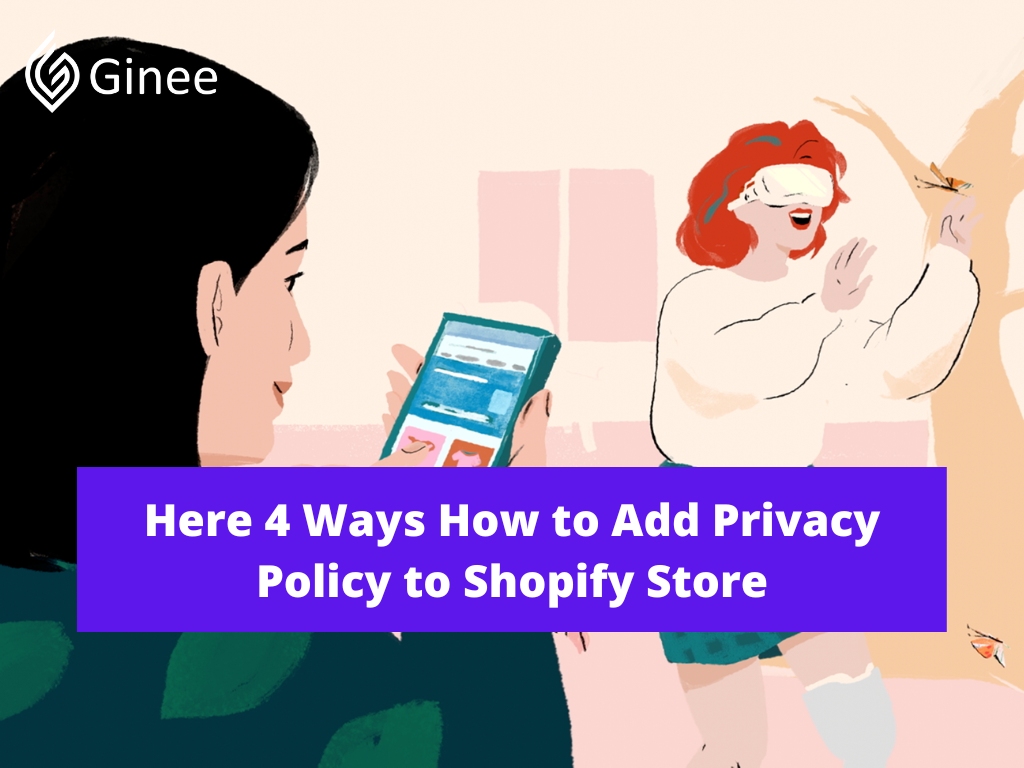How to add privacy policy to Shopify? The beauty of Shopify is in all the possibilities that it offers: from being able to get a store online in a matter of minutes by using an existing theme to using the services of a professional to create a fully custom website, the options are endless.
Whether you are an eCommerce newbie or an experienced online seller, you need to make sure that you remain compliant with all applicable laws, including the ones protecting the privacy of your potential and existing customers.
Your Selling Stock is Messing Up? You Need Help!
Ginee Omnichannel allow you to automatically sync every stock from all of your online stores. It’s faster way to helps you profit!
Why Do You Need a Privacy Policy For Your Shopify Store?

If you operate a transactional website, such as a Shopify privacy policy generator, you are no doubt processing personal information whether you realize it or not.
From the moment a potential customer lands on your website and signs up to your email list to receive a promotional offer to when that person finally checks out and provides you with their name, shipping address, and credit card details, you have collected information that could be used to identify them and thus can be considered personal.
Required by Law

Nowadays, most countries have enacted privacy laws that provide guidelines as to how businesses should go about informing, collecting, handling, and processing the personal information of their residents.
While you likely have a target market for your products, chances are that you will get some visitors and potential customers from other countries even if they don’t purchase right away, they might decide to sign up to your newsletter or create an account to save their favorite items for later.
These are all ways in which you can involuntarily collect personal information from international customers, thus the need to have a privacy policy that takes into account global laws that may apply to your business, and not just the laws of the country in which your business is based.
Europe

The General Data Protection Regulation (GDPR) applies to businesses that either operate in the European Economic Area (EEA) or that process the data of people located in the EEA.
Under the GDPR, those businesses have to have a privacy policy that is easily accessible and understandable in order to obtain affirmative and clear consent from users before collecting any personal information.
To be GDPR-compliant, a privacy policy must fulfill some basic requirements and contain all the essential elements mentioned in this piece of legislation.
United States

In the United States, while there is to date no privacy legislation at the federal level, the California Online Privacy Protection Act (CalOPPA) and the California Consumer Privacy Act (CCPA) should be taken into account.
While the CalOPPA requires that any commercial website that collects personal information from California residents have a conspicuously placed privacy policy that explains how it is collected, used, and shared.
The CCPA requires that users be served with a notice at the collection at or before personal information is collected (this notice needs to be linked to a privacy policy that is to be updated on a yearly basis).
Australia

If you’re a bigger business with an annual turnover of more than $3 million (or are a smaller organization that buys or sells personal information, provides health services, or is otherwise targeted by this piece of legislation), you will need to comply with Australia’s Privacy Act of 1988 and its Australian Privacy Principles.
This means that you will need to have an updated and clearly expressed privacy policy available free of charge, in an appropriate format and that contains all the information required under the law.
Worldwide

Many other countries other than the ones mentioned above require that businesses take steps to protect the personal information that they collect from their residents and require privacy policies to provide constituents with transparency and control over the data that they share.
Do You Want to Manage Multiple Marketplace Just by Single Person?
Of course you can! You can handle multiple stores from all marketplace just by single dashboard. Cut your Business’s cost, and Boost your Efficiency at the same time.
Before you start doing business online, stop and take a moment to consider which laws apply to you (i.e. where your customers could potentially be located) and make sure that you have an all-encompassing privacy policy before collecting personal information from your website visitors.
Required by Shopify

Now, if the fact that a privacy policy is required by law isn’t enough for you, Shopify itself requires that you have one in its terms of service, which includes their privacy policy and a section that is applicable to merchants.
This section specifies that because you, as a Shopify store owner, ultimately decide what information is collected from your customers and how it will be used, you have the responsibility to let them know how both you and Shopify treat their personal information.
It specifically mentions that you should do so by “at a minimum” having a privacy policy on your store. It also states that this privacy policy should address: what information both you (and Shopify on your behalf) collect, how you use the information collected and who you share it with (likely third-party integrations such as payment processing service providers and marketing analytics tools).
Shopify reserves the right to suspend or terminate accounts at any time, without notice, and for any reason; failing to comply with their terms of service by not having a privacy policy on your store could potentially give them a reason to cancel your account and if this is the only eCommerce platform that you use, your business. Don’t risk it!
How to Write a Privacy Policy for Your Shopify Store?

First things first, you will want to analyze your website and consider all the ways in which you may be collecting personal information from your website visitors. This could include collecting their:
- IP address when someone lands on your homepage.
- Name and email address when they sign up for your email list or create an account.
- Home address and telephone number when they make a purchase and enter their shipping information (this can be good for making free shipping policy template Shopify).
- Credit card details when they proceed to make a payment.
- Usage data, gender, and location if you use marketing analytics tool such as Google Analytics.
Additionally, consider all the plug-ins or applications that you have added to your Shopify store. Whether it be a payment processing provider, a currency conversion tool or a shipping tool that integrates with your store, the personal information of your customers is likely being shared with these third parties as it would be necessary for them to be able to provide their services.
Then, you can think about writing a privacy policy that will provide transparency to your future customers, make them trust you, and give them a way to contact you should they have any questions in regards to your data collection practices.
Read also: What is the Easiest Way on How to Add Collection in Shopify?
How to Add a Privacy Policy on Shopify?

Adding a privacy policy to your Shopify store or Shopify refund policy template couldn’t be easier! Here is how to add store policy Shopify template:
- Log in to your Shopify account and, from the admin screen, navigate to Settings – click on Legal.
- Copy and paste the privacy policy that you have generated in the box.
- Hit Save and voilà, you have just added a privacy policy to your Shopify store.
Read also: Make Shopify Store Live Now! Here 5 Steps to Start Doing It
Where to Display Your Privacy Policy?

You should make your privacy policy easily accessible and hard to miss. By following the steps above, a link to your privacy policy will automatically be added to your checkout page’s footer. However, you will want to add a reference to it in other places, most importantly your website footer.
In addition, it is good practice to make reference to your privacy policy anytime you collect personal information from your customers: at the time of account creation, during the checkout process, when filling out a customer service request, with any pop-up that prompts users to share their email address, etc.
Shopify Privacy Policy Examples

For online store policy examples, body care and fragrance retailer Crabtree & Evelyn’s website is powered by Shopify. As soon as new website visitors land on its homepage, they are served with this pop-up offering 15% off their first order in exchange for their email address for Shopify privacy policy template. Besides, you can also add Covid-19 prevention policy template Shopify!
Conclusion
Whether you have already started selling online or are just in the planning phases of your eCommerce business, it’s never too late to start thinking about your privacy policy or to give it a bit of a refresh.
Note that while you have the option to generate a privacy policy directly in Shopify, you do remain responsible for its content and for ensuring that all elements pertaining to your business, privacy practices, and applicable legislation are included.
Join Ginee Philippines!
Besides adding privacy policy to Shopify store, you also need to know how to manage your online store in Shopify or if registered in different marketplaces. Relax, Ginee can help you with that! With Ginee, you can manage products, stocks, orders, promotions, chats, ads campaigns, and more only in a single dashboard. Join Ginee Philippines now FREE!
Upload Products to Shopee and Lazada Automatically! How?
Ginee product management allow you upload products to all of your online stores from all marketplace just once! Save time, save cost, save energy, join Ginee Now!








